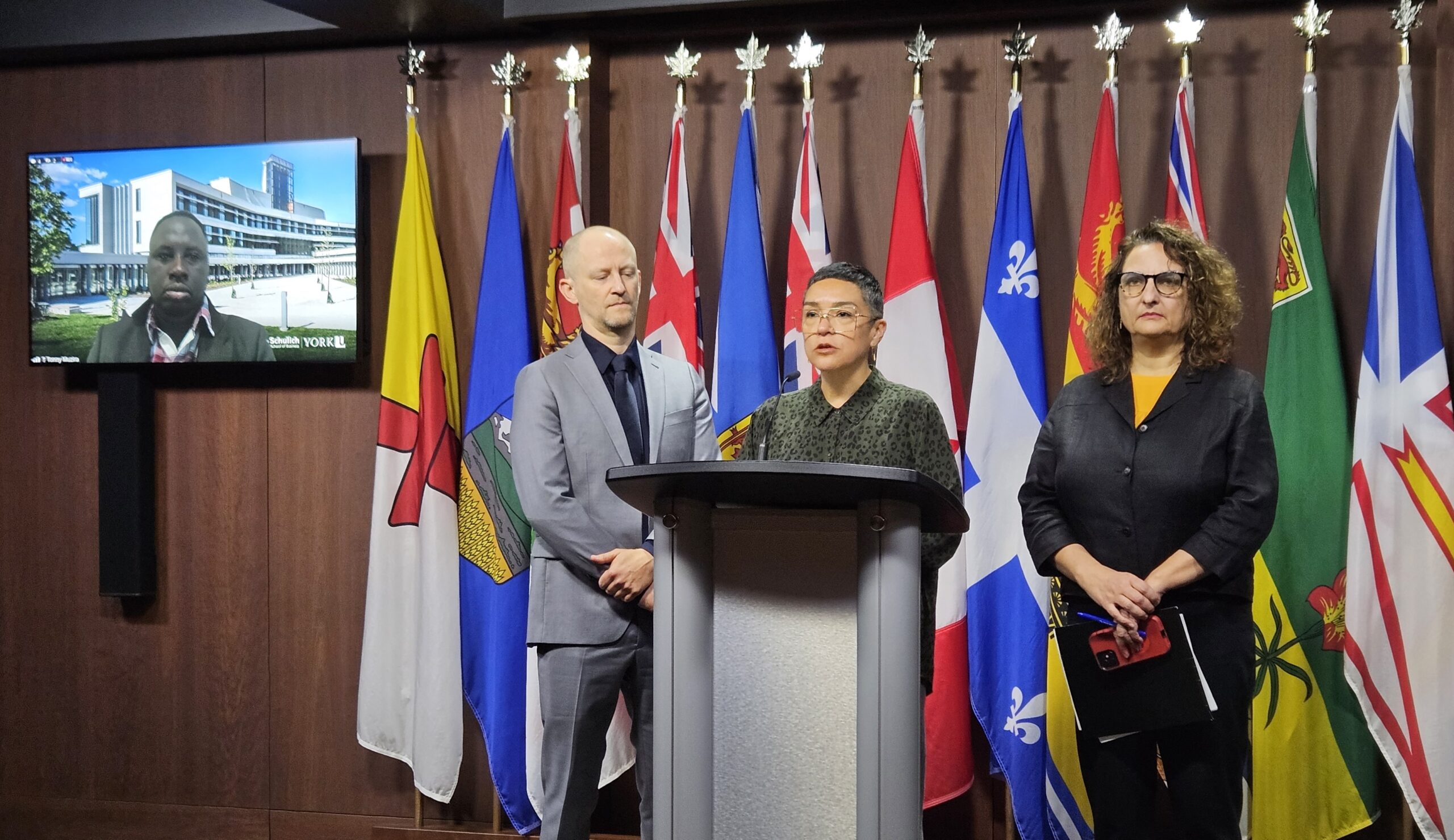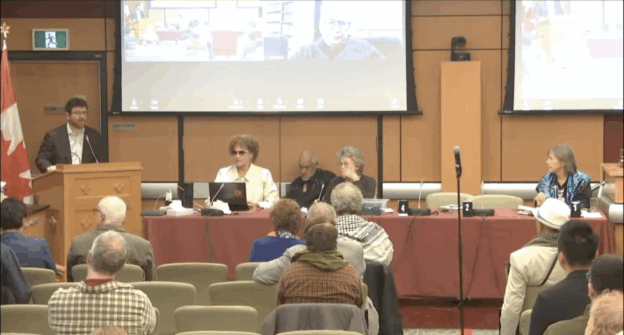
At a news conference in Ottawa, a coalition of civil society groups call for the withdrawal of the federal government’s border security bill (C-12). Watch it here.
Speaking with reporters are Gauri Sreenivasan (Canadian Council for Refugees), Tamir Israel (Canadian Civil Liberties Association), Louis-Philippe Jannard (Table de concertation des organismes au service des personnes réfugiées et immigrantes, Front Commun Contre le Projet de Loi C-12), Nick Boyce (Canadian Drug Policy Coalition), Tonny Muzira (Centre for Black Development Options Canada), and Karen Cocq (Migrant Rights Network).
As a member of the network of organizations holding today’s press conference, the ICLMG supports the ongoing call to withdraw Bill C-12, which will significantly undermine the Charter rights and civil liberties of people across Canada, and especially migrants and refugees already facing threats to their safety.
“It is unacceptable that the Liberal government continues to use the excuse of protecting ‘national security’ to justify laws that will make people across Canada less safe, that threaten our privacy, that erode protections for migrants and refugees, and that will force people back to countries where their lives and rights are threatened. MPs must vote against this bill, and the government must recommit to meeting its domestic and international human rights obligations towards migrants and refugees,” said Tim McSorley, ICLMG national coordinator.
Press release
Blocked From Testifying, Civil Society Groups Urge Withdrawal of Bill C-12 Citing Threats to Human Rights and to Fundamental Justice
OTTAWA, Nov. 24, 2025 – A broad coalition of groups from across Canada is sounding an urgent alarm in advance of a critical parliamentary vote on Bill C-12.
The bill would open the door to discrimination and violations of human rights and due process in Canada’s immigration system, authorize sharing of sensitive personal immigration information, and expand dangerous approaches to drug policy. Yet it is being pushed through parliament with minimal debate while those that will be impacted by its sweeping changes are locked out of the process.
“This deeply concerning and highly controversial legislation will put many refugees in danger, risking their return to persecution in violation of rights protected under the Charter and international law,” said Gauri Sreenivasan, Co-Executive Director of the Canadian Council of Refugees. “And yet the bill is moving at break neck speed through Parliament while those with expertise and lived experience who want to advise on its dangers are shut out of the process. Neither the law nor the public interest is being served.”
The bill will deny many refugees access to fair and independent assessment and full appeal of their claims by the Immigration and Refugee Board because of arbitrary time limits and exclusions. This approach will not streamline Canada’s processing of refugee claims, but will lead to lower quality decisions while shifting backlogs to our already overburdened Federal Courts and to IRCC.
The bill will also compound harm arising from the Canada-US Safe Third Country Agreement, which abandons many refugees to the U.S. immigration system at a time when well documented human rights violations have become the dominant feature of that system.
”Bill C-12 would deny protection to vulnerable people irrespective of changes to their personal circumstances or political conditions back home. So many people like me, who sought safety here and have made lives here, would be shut out by this Bill. This isn’t just policy, it’s people’s lives,” said Tonny Muzira, Co-Founder & Director of Advocacy and Partnerships Centre for Black Development Options Canada. “Canada cannot turn its back on those seeking safety.”
Under Bill C-12, the government will also be able to cancel or suspend immigration documents and applications based on an undefined assessment of the “public interest”. This power grants dangerous discretionary power to the government without any individualized assessment or procedural safeguards.
“The bill sets up open-ended powers with little thought to the consequences and inevitable abuse”, said Louis-Philippe Jannard, of the Table de concertation des organismes au service des personnes réfugiées et immigrantes (TCRI). “We haven’t seen such broad, discretionary powers in our immigration system since the 1970’s, when their abuse led to rampant discrimination and fatal decisions.”
Bill C-12 would also authorize the government to share highly sensitive immigration information with few limitations. This includes changes in gender identity and the status of any refugee claimants, exposing vulnerable people in Canada to severe risk.
“Broad dissemination of sensitive personal information can place migrants and refugees at significant risk of discrimination and persecution in Canada and abroad”, said Tamir Israel, Director of the Canadian Civil Liberties Association’s Privacy, Surveillance and Technology Program. “Despite this significant potential for abuse, Bill C-12 lacks minimum safeguards like the need to ensure information sharing is necessary and proportionate.”
Bill C-12 also doubles down on prohibition-based drug policy that has demonstrably failed to protect public health and safety.
“Instead of funding affordable housing and other health and social supports, Canada is supporting U.S.-led militarized drug enforcement,” said Nick Boyce, from the Canadian Drug Policy Coalition. “If Canada follows this path, it will be complicit in violations of international human rights law.”
In disregard of the dire risks posed by this legislative proposal, the bill has been fast-tracked and received minimal consideration in Parliament. It is scheduled for a final vote by the Standing Committee on Public Safety tomorrow—just three weeks after its study of the bill began.
Despite the highly attenuated timeline, dozens of refugee and migrant groups, human rights groups, labour organizations, health advocacy groups, representatives of the Black community, gender based violence groups, legal professional bodies, drug policy groups and others requested to speak at committee hearings but were denied. They have also submitted briefs expressing concern regarding Bill C-12’s consequences.
These groups were largely absent from committee proceedings and MPs will not have the time to consider the long list of concerns raised by these submissions. In contrast, MPs heard repeatedly from border and policing agencies and officials. The end result is that the voices of those most impacted by Bill C-12 have not been heard.
“MPs and the public should be extremely concerned that the government is fast-tracking legislation that will only multiply the possibility of discrimination, exploitation, and violations of human rights,” said Karen Cocq of the Migrant Rights Network. “ This government got elected promising to reject Trump-style politics, but Bill C-12 is the opposite of that. This bill cannot be fixed, it must be withdrawn.”
Since you’re here…… we have a small favour to ask. Here at ICLMG, we are working very hard to protect and promote human rights and civil liberties in the context of the so-called “war on terror” in Canada. We do not receive any financial support from any federal, provincial or municipal governments or political parties. You can become our patron on Patreon and get rewards in exchange for your support. You can give as little as $1/month (that’s only $12/year!) and you can unsubscribe at any time. Any donations will go a long way to support our work. |



